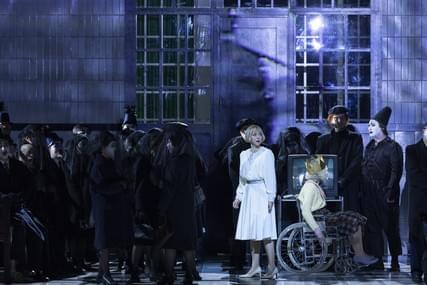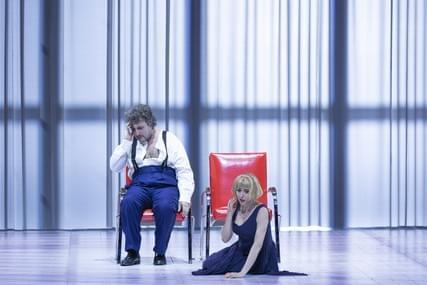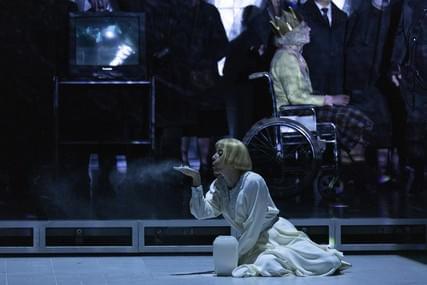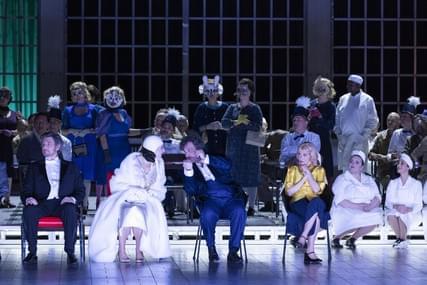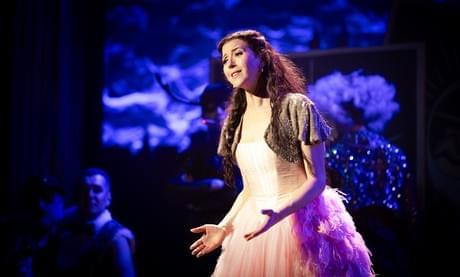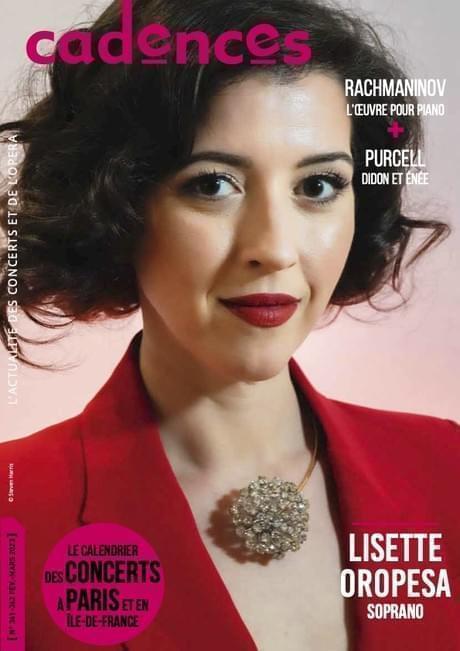Cast
| Hamlet | Ludovic Tézier | |
| Ophélie | Lisette Oropesa | |
| Claudius | Jean Teitgen | |
| Laërte | Julien Behr | |
| Ghost of the late King Hamlet | Clive Bayley | |
| Horatio | Frédéric Caton | |
| Marcellus | Julien Henric | |
| Gertrude | Eve-Maud Hubeaux | |
| Polonius | Philippe Rouillon | |
| Gravedigger | Alejandro Baliñas Vieites | |
| Second Gravedigger | Maciej Kwaśnikowski |
Pierre Dumoussaud
DirectorKrzysztof Warlikowski
DramaturgeChristian Longchamp
CostumesMałgorzata Szczęśniak
LightingFelice Ross
VideographerDenis Guéguin
ChoreographyClaude Bardouil
ChorusmasterChing-Lien Wu
About
Live Stream
ARTE France, France 2023, 185 min., live
The abysses of the human psyche are a central element of Krzysztof Warlikowski's productions. With Hamlet he also explores the madness that underlies Shakespeare's drama and Ambroise Thomas's setting. Under the musical direction of Pierre Dumoussaud, the great French baritone Ludovic Tézier interprets the title role, Lisette Oropesa , a few days ago at the “Opera! Awards” for “Best Female Singer” can be experienced as Ophelia. The Orchester de l'Opéra national de Paris plays. ARTE will show the new production on March 30, 2023 at 7.30 p.m. in the live stream
Synoposis
The opera Hamlet by Ambroise Thomas is an adaptation of William Shakespeare's famous play, "The Tragic History of Hamlet, Prince of Denmark". The opera is set in the 19th century, which was a time when Shakespeare's works were a constant source of inspiration for the Romantics. The play explores the existential questions of the title role, Hamlet, as he struggles with the ghost of his murdered father and his doomed love for Ophelia. Alexandre Dumas père was fascinated by this drama and in 1847 he produced a highly successful adaptation of the play.
It was on the basis of Dumas' version that Michel Carré and Jules Barbier gave Ambroise Thomas the libretto for Hamlet. The opera was the last one to be performed in the Salle Le Peletier and was inspired by the musical and dramaturgical forms of French grand opera. The composer imbued the story with an intensity that contributes to the beauty of the score. It is considered a milestone in opera and Krzysztof Warlikowski, a contemporary director, attempted to redraw the Shakespearean contours to fathom the depths of the human psyche.
In this opera, Hamlet is portrayed as a complex and multi-faceted character, grappling with the question of taking revenge for his father's murder. The opera also delves into his doomed love for Ophelia, and the existential questions he is faced with. The music of the opera is grand, intense and evocative, with a focus on the emotional turmoil of the characters. It also features elements of French grand opera, with striking choral and orchestral arrangements.
Overall, the opera Hamlet by Ambroise Thomas is a powerful and moving adaptation of Shakespeare's play, using the musical and dramaturgical forms of French grand opera, imbuing the story with an intensity that contributes to the beauty of the score. It's a work that explores the depths of the human psyche and continues to be performed and appreciated by audiences around the world.



